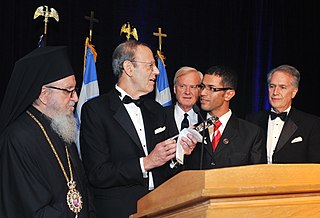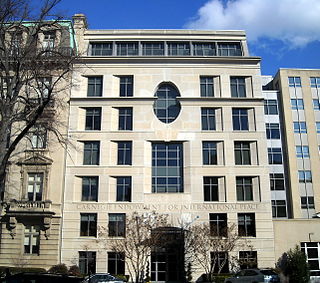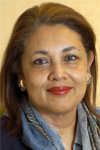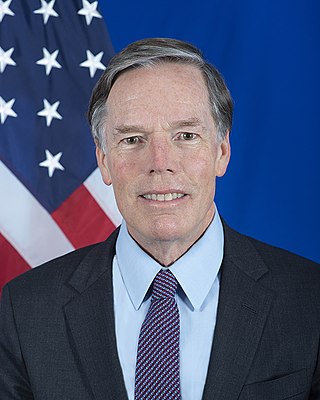
The United States National Security Council (NSC) is the principal forum used by the president of the United States for consideration of national security, military, and foreign policy matters. Based in the White House, it is part of the Executive Office of the President of the United States, and composed of senior national security advisors and Cabinet officials.

The National Endowment for Democracy (NED) is a quasi-autonomous non-governmental organization in the United States founded in 1983 to advance democracy worldwide, by promoting political and economic institutions, such as political groups, trade unions, free markets, and business groups.

The Carnegie Endowment for International Peace (CEIP) is a nonpartisan international affairs think tank headquartered in Washington D.C., with operations in Europe, South and East Asia, and the Middle East as well as the United States. Founded in 1910 by Andrew Carnegie, the organization describes itself as being dedicated to advancing cooperation between countries, reducing global conflict, and promoting active international engagement between the United States and countries around the world. It engages leaders from multiple sectors and across the political spectrum.

Winston Lord is an American diplomat and leader of non-governmental foreign policy organizations. He has served as Special Assistant to the National Security Advisor (1970–1973), Director of the State Department Policy Planning Staff (1973–1977), President of the Council on Foreign Relations (1977–1985), Ambassador to China (1985–1989), and Assistant Secretary of State (1993–1997).

Shirin R. Tahir-Kheli is an American political scientist who also served in the Department of State. In 2006, she was appointed as the first Ambassador for women's empowerment by the United States Secretary of State Condoleezza Rice as well as Senior Advisor to the Secretary of State on United Nations Reform. She was sworn in as the First American Muslim Ambassador in July 1990. Dr. Tahir-Kheli was the Special Assistant to the President and Senior Director for Democracy, Human Rights and International Operations at the White House National Security Council, from 2003-2005. She has served three Republican presidential administrations since 1980.

Jon Wolfsthal is an American security analyst currently serving as director of global risk at the Federation of American Scientists.

Robert Nicholas Burns is an American diplomat and academic who has served as the United States ambassador to China since 2022.

William Joseph Burns is an American diplomat who has served as director of the Central Intelligence Agency (CIA) in the Biden administration since March 19, 2021. He previously served as U.S. deputy secretary of state from 2011 to 2014; in 2009 he served as acting secretary of state for a day prior to the Senate confirmation of Hillary Clinton. Burns retired from the U.S. Foreign Service in 2014 after a 32-year diplomatic career. From 2014 to 2021, he served as president of the Carnegie Endowment for International Peace.

Jessica Tuchman Mathews is an American international affairs expert with a focus on climate and energy, defense and security, nuclear weapons, and conflict and governance. She was President of the Carnegie Endowment for International Peace, an international affairs think tank headquartered in Washington, D.C., with offices in five other countries, from 1997 to 2015. She has also held jobs in the Executive and Legislative branches of government, management and research in nonprofits, and journalism.
Joshua Kurlantzick is an American journalist from Baltimore, Maryland, United States. He is a Fellow for Southeast Asia at the Council on Foreign Relations.
Authoritarianism is a political system characterized by the rejection of democracy and political plurality. It involves the use of strong central power to preserve the political status quo, and reductions in the rule of law, separation of powers, and democratic voting. Political scientists have created many typologies describing variations of authoritarian forms of government. Authoritarian regimes may be either autocratic or oligarchic and may be based upon the rule of a party or the military. States that have a blurred boundary between democracy and authoritarianism have some times been characterized as "hybrid democracies", "hybrid regimes" or "competitive authoritarian" states.

Morton Isaac Abramowitz is an American diplomat and former U.S. State Department official. Starting his overseas career in Taipei, Taiwan after joining the foreign service, he served as U.S. Ambassador to Thailand and Turkey and as the Assistant Secretary of State for Intelligence and Research. He retired from the State Department with the rank of Career Ambassador. He then became president of the Carnegie Endowment for International Peace and founded the International Crisis Group.

Eileen Chamberlain Donahoe is a former U.S. Ambassador to the United Nations Human Rights Council in Geneva, Switzerland, having been appointed by President Barack Obama in 2009. After serving her term as ambassador, Donahoe was appointed as Director of Global Affairs for Human Rights Watch. In 2014, she was also appointed to the board of International Service for Human Rights. She is also an affiliate of Stanford University's Center for International Security and Cooperation, a center of the Freeman Spogli Institute for International Studies and Executive Director of the Global Digital Policy Incubator at the Freeman Spogli Institute's Cyber Policy Center working at the intersection of governance, technology and human rights.

Douglas Haines Paal is vice president for studies at the Carnegie Endowment for International Peace, where he directs the endowment's Asia Program. He served as the director of the American Institute in Taiwan from 2002 to 2006 and worked on the National Security Council staffs of Presidents Reagan and George H. W. Bush between 1986 and 1993 as director of Asian Affairs, senior director, and special assistant to the President. He was vice chairman of JPMorgan Chase International from 2006 to 2008. He also serves as a member of the board of trustees of the Asia Foundation.
Thomas Carothers is an American lawyer and an expert on international democracy support, democratization, and U.S. foreign policy. He is a senior fellow at the Carnegie Endowment for International Peace, where he founded and currently co-directs the Democracy, Conflict, and Governance Program. He has also taught at several universities in the United States and Europe, including Central European University, the Johns Hopkins School of Advanced International Studies, and Nuffield College, Oxford.
William J. "Will" Dobson is an American journalist and author who writes frequently on foreign affairs and international politics. He is the co-editor of the Journal of Democracy. Previous roles include Chief International Editor at NPR and the Politics and Foreign Affairs Editor for Slate.
Paul Thomas Haenle is an American analyst and China specialist currently serving as Maurice R. Greenberg Director’s Chair at the Carnegie Endowment for International Peace.

Carla Canales is an American mezzo-soprano singer, educator, cultural diplomat, arts advocate, author, and non-profit entrepreneur.
Sharp power is the use of manipulative diplomatic policies by one country to influence and undermine the political system of a target country.

Thomas J. Christensen is an American political scientist. He is the James T. Shotwell Professor of International Relations at the School of International and Public Affairs, Columbia University.














